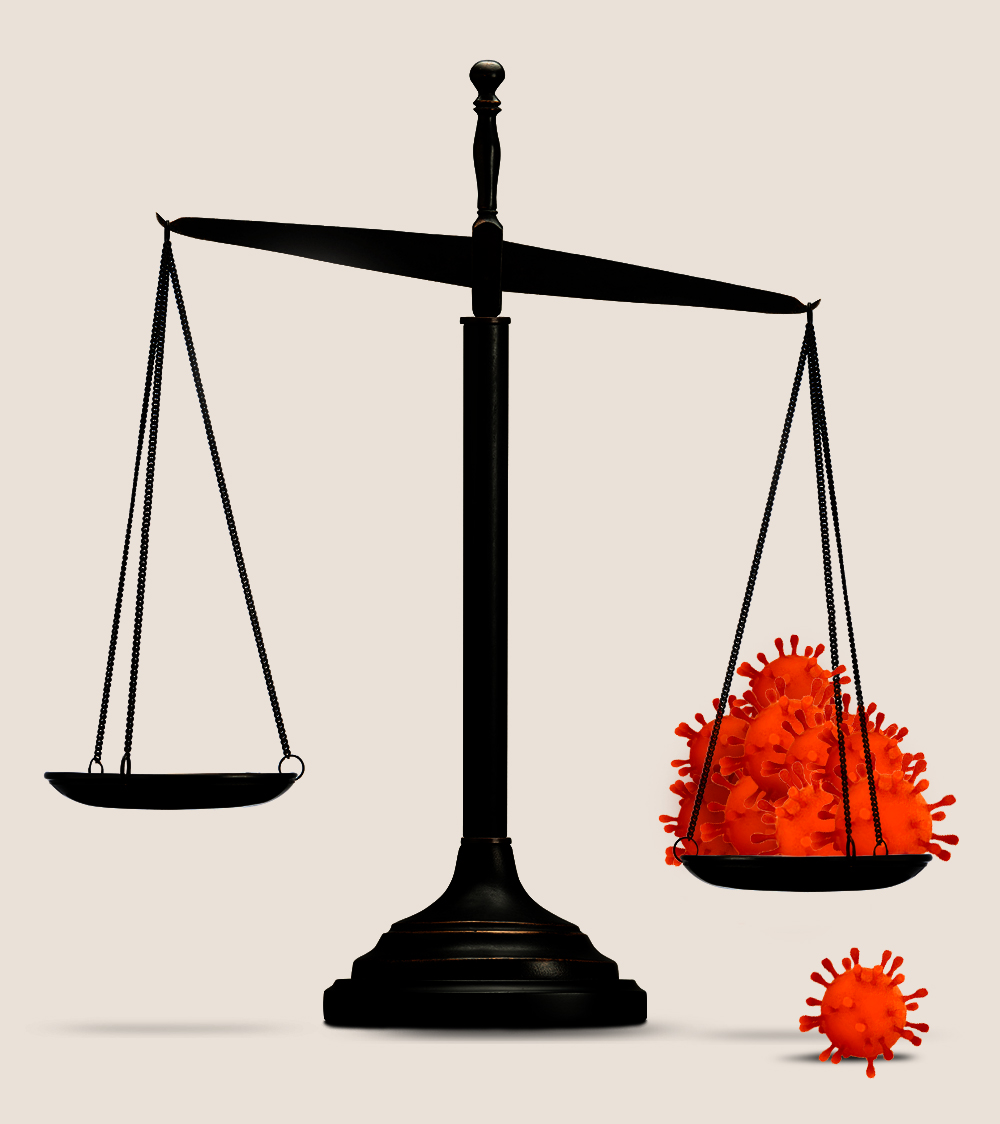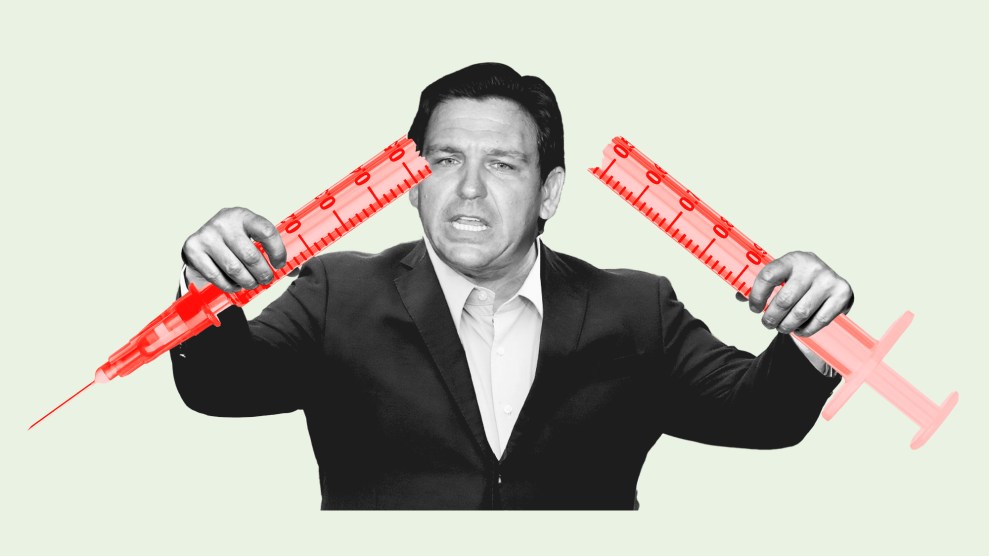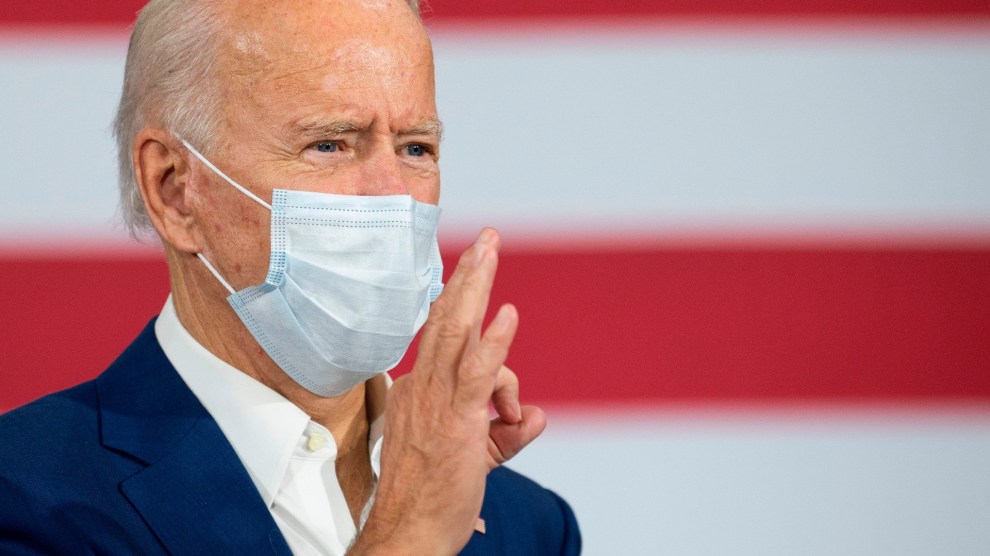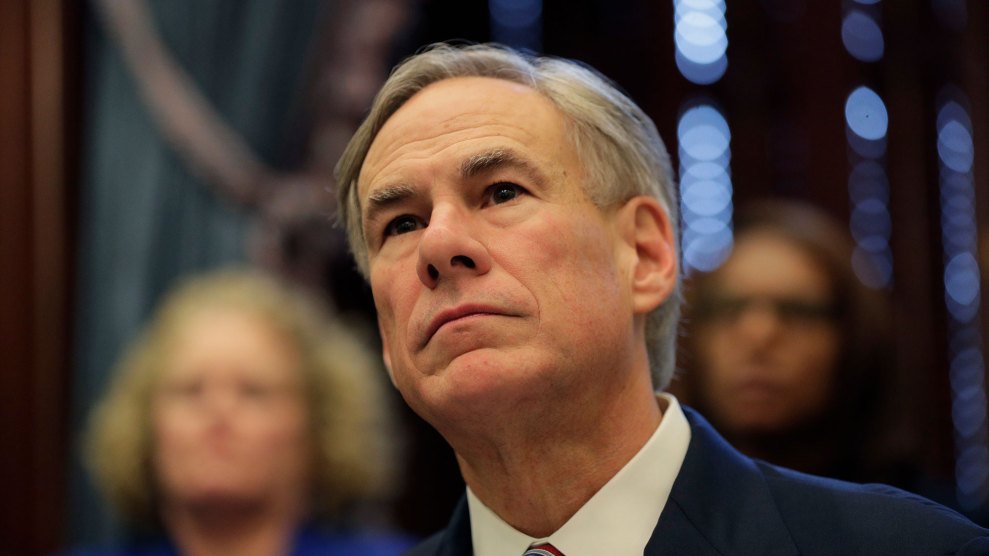In late March, I watched as some 300 lawyers, doctors, and activists assembled in the aggressively beige conference wing of the Midtown Atlanta Hilton for the inaugural Covid Litigation Conference. A promotional flier promised that the event would “provide attendees with the resources they need to begin taking on Covid cases for the first time or to expand the range of Covid claims that they currently handle.” An unsuspecting lawyer could have been forgiven for expecting tips on how to help clients who had been disabled by Covid that they caught at their factory jobs, for instance, or those whose medical bills their insurance refused to pay.
But those kinds of cases were entirely absent from the agenda. Rather, the topic was a very particular kind of litigation: How best to advance the movement that organizers called “medical freedom.” In other words, how to sue the people who created and enforced public health measures like vaccine and mask requirements, policies against Covid misinformation, and treatment protocols for hospitalized Covid patients.
The conference organizers wore t-shirts emblazoned with the slogan “Misinformation Superspreader.” Steve Kirsch, a Silicon Valley entrepreneur, philanthropist, and a main organizer of the event, told me that the slogan was a cheeky reference to what he saw as the unfair labeling of anti-vaccine activists as peddlers of misinformation. “We said, ‘Okay if that’s what they’re calling us,” he explained, “let’s kind of make fun of it.” Indeed, many of the attendees seemed to see themselves as underdogs, scrapping against government and pharmaceutical behemoths.
What those underdogs didn’t mention during the sessions, though, is their friends in high places: specifically, federal judges who seem to be sympathetic to their aversion to pandemic policies. Pointing to some of the victories that medical freedom lawyers have enjoyed in US District courts, Dorit Reiss, a public health lawyer and law professor at the University of California College of the Law, noted, “They’re having some success in the federal system in front of Trump-appointed judges, and they’re very much forum shopping right now.” Adam Winkler, a constitutional law scholar at the University of California-Los Angeles, agreed. “The courts have issued a lot of what were once thought to be outlandish kinds of rulings with regard to any number of issues like abortion and affirmative action,” he said. “I’d expect that encourages people to bind hope to the prospects of lawsuits that they would otherwise seem certain to lose.”
When I arrived, I didn’t think I’d get past the Misinformation Superspreaders and make it into the ballroom where the event was taking place. The media liaison for the conference, Trevor FitzGibbon, asked me if I was there to write about disinformation, and he seemed to balk at my affirmative answer. When I said I worked for Mother Jones, he noticeably brightened. He had come up in the PR business working for prominent progressive candidates and groups, he explained, including Barack Obama, MoveOn, and Planned Parenthood, which I took to mean that he considered us to be politically kindred spirits. And then he let me into the ballroom.
Once inside, I watched as one indignant panelist after another enumerated their grievances. At the Hospital Negligence Panel, doctors who refused to deviate from CDC protocol to treat Covid patients with unproven drugs like the antiparasitic medication ivermectin and antimalarial hydroxychloroquine were the targets of rage. The Education Mandates session featured the mother of a California teenager who had defied her school’s mask requirement, showing up at school without a mask for weeks on end in 2021, and standing outside the school for hours every day after she was kicked out. The panelists batted around ideas: Could the refusal to wear a mask be considered free speech? Could putting a kid in detention for not wearing a mask count as false imprisonment?
In his speech, Kirsch, the conference organizer, told the story of how, at the beginning of the pandemic, he had invested $1 million of his own money toward studying existing drugs as potential Covid treatments. Somewhere along the way, he became convinced that the Covid vaccines were dangerous. Last year, he founded the Vaccine Safety Research Foundation, whose goal, according to its website, is “to advance COVID-19 vaccine safety through scientific research, public education, and advocacy, and to support the vaccine injured.” After his speech, Kirsch told me that he sees litigation as a way to force the federal government agencies to release data that he believes they’re concealing about the dangers of the Covid vaccines. He said he is sure that “the only reason that we’re not allowed to see any of the data is because it’s bad.”
Many of the other speakers seemed to share Kirsch’s belief that the public isn’t seeing the whole picture of Covid. In a constitutional law panel, Robert Barnes, an attorney who previously represented both Kenosha shooter Kyle Rittenhouse and Sandy Hook conspiracy theorist Alex Jones, said, “Pfizer makes the Mexican drug cartels look like a street corner dealer by comparison.” To hold the public health crowd accountable, he implored the lawyers at the ballroom tables to “knock down the doors of every court we can.”
But not just any court. Medical freedom activists have already started enjoying some successes in front of conservative judges. At the local level, several have sided with plaintiffs who’ve sued hospitals for refusing to give patients ivermectin. But it’s been on the federal level, with Trump-appointed judges, where they’ve enjoyed some of their most significant successes. In 2021, Texas Attorney General Ken Paxton sued the Biden administration over a proposed policy that would have required Covid vaccinations for all Head Start employees. In March 2023, Judge James Wesley Hendrix of the Northern District of Texas, a Trump appointee, struck down the proposed policy. In January 2022, a group of government workers sued the Biden Administration over the president’s vaccination requirements for all federal employees; in 2022, Judge Jeffrey Vincent Brown, whom Trump appointed in 2019, ruled in their favor. That ruling was briefly overturned, but in 2023, the 5th US Circuit Court of Appeals in New Orleans upheld it; the opinion was written by Trump appointee Judge Andrew Oldham.
In August 2022, a group of physicians sued the Biden Administration over its efforts to hold social media companies accountable for platforming physicians who spread misinformation about Covid. The plaintiffs, two of whom created the 2020 Great Barrington Declaration to oppose pandemic protections, accused the federal government of violating their First Amendment rights. “The US government used its vast power over social media and big tech to censor legitimate scientific and policy discussion about Covid during the pandemic,” Jay Bhattacharya wrote in a statement. That case is still ongoing, but in March, Trump-appointed judge Terry Doughty, in the Western District of Louisiana, denied a motion to dismiss it.
There is more to come. Several of the conference speakers have embarked on a Covid litigation bonanza of late. Mark Meuser, a member of the Future Litigation and Censorship panels, boasts on his website that he “has been involved in 22 lawsuits brought against [California Governor Gavin] Newsom for his unconstitutional usurpation of power as a result of COVID-19.” In the exhibition area, I visited the booth of Children’s Health Defense, the anti-vaccine organization helmed by the new presidential hopeful Robert F. Kennedy, Jr., who announced his bid to replace Joe Biden in April. A flier that highlighted some of the dozens of lawsuits that the group had recently filed reveals its eagerness to sue the government, at both local and federal levels. It’s suing California over a law that prohibits doctors from spreading misinformation; the Washington Post and other news outlets over their efforts to stop the spread of misinformation; and the CDC for access to reports of “unusual or unexpected patterns of adverse events reporting that can signal safety problems with a vaccine.” Sen. Elizabeth Warren (D-Mass.) is getting sued for calling for a review of the Amazon algorithms that allegedly promoted anti-vaccine books, and Facebook parent company Meta is being sued for “collusion with the US government to censor CHD social media content.” Add to the long list of defendants Rutgers University for its vaccine mandate for students and staff.
Law professor Reiss is dubious about the prospects for some of those lawsuits, especially those in which individuals sue a private company for censorship. The First Amendment, she noted, also protects “the freedom of private companies like Twitter and YouTube to kick them off.” Nor was the idea of students suing universities, a winning strategy. “You don’t have the right to go to a specific university,” she said. “And if you don’t like the university policies, universities are on pretty solid grounds denying you admission.”
Yet she noted that some of the victories the medical freedom movement has racked up so far could pave the way for future legislation that would last long beyond the Covid era—and possibly transform established public health practices. In fact, that’s already happening: Several panelists suggested making vaccination status a protected class like race or sex—which means that it would be illegal to discriminate against someone on the basis of whether or not they had received immunizations. In 2021, Montana became the first state to pass such a law. In February of this year, Idaho followed suit. Employers there who require vaccination against Covid can now be fined $1,000 per violation. A similar bill in Florida is currently under consideration.
Another potential opening for medical freedom advocates, Reiss said, is a broader interpretation of laws about religious exemptions to vaccine mandates, which most states allow. With the current Supreme Court’s expansion of what is included within the definition of freedom of religion, she worried they may include religious objections to vaccines. “If they go there, it will make it a lot harder to prevent the abuse of religious exemption,” she said. On April 18, a few weeks after I spoke to Reiss, a US district judge ruled that Mississippi must change its current policy to allow religious exemptions for vaccine mandates. (The judge, Halil Suleyman Ozerden, had been nominated by Trump in 2019 to serve on the 5th Circuit Court of Appeals, but key Republicans questioned his conservative bona fides and he was never confirmed.)
With all this coming litigation, some of the conference sponsors saw a business opportunity. While the speakers inside the ballroom railed against big pharma and the CDC, just outside, representatives from law-firm-adjacent companies handed out business cards. Zena Obebe, the CEO of Hill Redaction Services, told me, “We wanted to get in front of those litigation lawyers and say, ‘Hey, you can use us for the medical records.’” She expects to see many more Covid-related cases soon, explaining, “There’s a huge influx that’s coming down the pipeline.”
Though Covid was the official topic of the conference, many of the people I talked to made detours into other subjects. Their involvement in the medical freedom movement, they said, had caused the scales to fall from their eyes. Kirsch, the conference organizer, explained that before the pandemic, he had never been skeptical of routine childhood vaccinations, but over the past few years, he has come to believe they cause autism (a theory that has been extensively discredited but one cherished by RFK, Jr. whose campaign, Kirsch says, he looks forward to supporting). So fervent is his newfound aversion to immunizations, he told me, that he now believes “nobody should ever” even vaccinate their pets.
For FitzGibbon, the comms guy, his involvement with the medical freedom movement has led to a more thorough disenchantment with his progressive roots. In 2020, during the height of the pandemic, he had become acutely ill with Covid, but two different hospitals sent him home. Only when a doctor-client put in a good word for him did he get admitted to an ICU, where he received monoclonal antibodies—an effective though underutilized treatment—which he credits with saving his life.
In the months that followed, he became skeptical of what he saw as the single-minded focus on Covid vaccines and what he considered to be the suppression of treatments like the one he received, as well as more scientifically dubious drugs like ivermectin and hydroxychloroquine. “All you saw in the US media was vaccine, vaccine, vaccine,” he said. “Any other mentions of these alternative treatments were blacklisted.” He now believes not only that the Covid vaccines are bioweapons, but also that the Democratic party has lost its way—he saw it even before Covid in Democrats’ soft stance on domestic surveillance under Obama, and now he sees it in foreign policy, too. In a pivot I frankly did not see coming, he said, “I do not recognize this administration or this party when it comes to the war in Ukraine,” especially since he claims that Russia had good reason to invade the country because of its problem with Nazis (ostensibly a reference to Russian President Vladimir Putin’s shaky-at-best justification for his invasion).
It’s possible, though, that something unrelated to politics deepened his disenchantment with progressives: In 2015, his PR firm closed abruptly after several female former employees accused him of sexual assault and harassment; he spoke to me on the condition that I note that the US Attorney declined to file any criminal charges, and a woman who had accused him of rape publicly retracted her allegations and apologized as part of a settlement in 2019.
Both Kirsch and FitzGibbon complained that progressive groups with whom they both were previously allied would no longer return their calls—about Covid or anything else. Aggrieved, they were determined to press on in what they saw as a countercultural but righteous crusade—a sentiment echoed by many of the speakers. Their alienation and what they consider to be oppression only further energizes them and their cause. In a heartfelt speech in the ballroom, Sujata Gibson, a New York-based lawyer and activist who recently won a lawsuit that led to New York overturning its vaccine mandate for healthcare workers, compared current medical freedom activism to the Indian struggle for independence, Nelson Mandela’s campaign against apartheid in South Africa, and the American civil rights movement. “Part of what we have to do as lawyers when we’re in these tyrannical moments in history—and this one is quite extreme—is we have to hold the line in the courts,” she said. “I’ve been lucky enough to see time after time how David and Goliath battles can be won.”
















